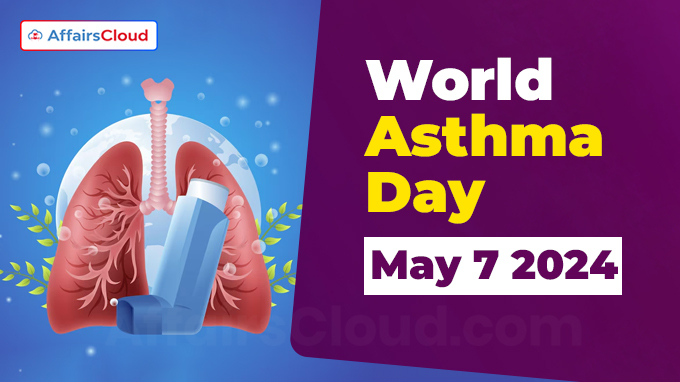 World Asthma Day (WAD) is annually observed across the globe on the 1st Tuesday of May to raise awareness of Asthma, one of the most common chronic non-communicable diseases (NCD), affecting both children and adults.
World Asthma Day (WAD) is annually observed across the globe on the 1st Tuesday of May to raise awareness of Asthma, one of the most common chronic non-communicable diseases (NCD), affecting both children and adults.
- World Asthma Day 2024 was observed on 7th May 2024.
- World Asthma Day 2023 was observed on 2nd May 2023 and World Asthma Day 2025 will be observed on 6th May 2025.
The annual observance of WAD is led by Global Initiative for Asthma (GINA) which also chooses the theme of WAD.
- GINA coordinates the preparation and distribution of WAD materials and resources.
Theme:
The theme of WAD 2024 is “Asthma Education Empowers”.
- The theme underscores the significance of empowering asthma patients through education that enables individuals to effectively manage their condition and make informed decisions regarding their health.
Background:
i.The 1st World Asthma Day was observed by GINA in 1998.
ii.The day was observed in conjunction with the first World Asthma Meeting in Barcelona, Spain which witnessed the participation of over 35 countries.
Why May?
May is chosen for the observance since it coincides with the spring and fall seasons when asthma symptoms typically worsen.
- May is also observed as World Allergy and Asthma Awareness Month.
What is Asthma?
i.Asthma is a chronic respiratory disease affecting 1 to 29% of the population in different countries, characterized by recurrent attacks of breathlessness, wheezing, and chest tightness.
ii.It manifests through inflammation and narrowing of the small airways in the lungs, resulting in various symptoms.
iii.Inhaled medications serve as effective tools in controlling asthma symptoms, facilitating a normal and active lifestyle.
Impact:
i.Asthma is often under-diagnosed and under-treated, particularly in low- and middle-income countries (LMICs).
ii.Under-treated asthma can result in sleep disturbances, daytime fatigue, and concentration issues.
iii.Asthma symptoms differ among individuals and can worsen during asthma attacks, often worsened at night or during physical activity.
Causes:
Many factors have been linked to an increased risk of developing asthma. Some of them are: Genetics; Allergies; Urbanization (Lifestyle changes in urban settings; Early Life Factors (Low birth weight, prematurity, Exposure to tobacco smoke, air pollution, and viral infections); Obesity.
Treatment Options:
i.Inhalers are the cornerstone of asthma management, facilitating direct lung medication delivery.
ii.There are 2 main types of inhalers: bronchodilators (such as salbutamol); and steroids (such as beclometasone).
Global Impact and WHO’s Role:
i.Over 250 million individuals suffer from asthma globally, with significant mortality rates, particularly in low- and middle-income countries (LMICs).
- Over 90% of asthma-related deaths occur in these regions.
ii.The Global Alliance against Chronic Respiratory Diseases (GARD) is a World Health Organisation (WHO)-convened network committed to reducing the global burden of chronic respiratory diseases, focusing on LMICs.
About Global Initiative for Asthma (GINA):
GINA was launched in 1993 in collaboration with the National Heart, Lung, and Blood Institute, National Institutes of Health, United States of America (USA), and WHO.
MD and Chair– Arzu Yorgancioglu (Türkiye)
Headquarters- Wisconsin, The United States of America(USA)




